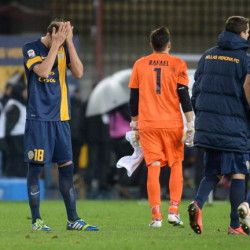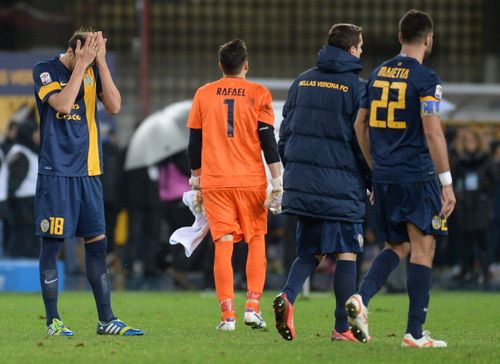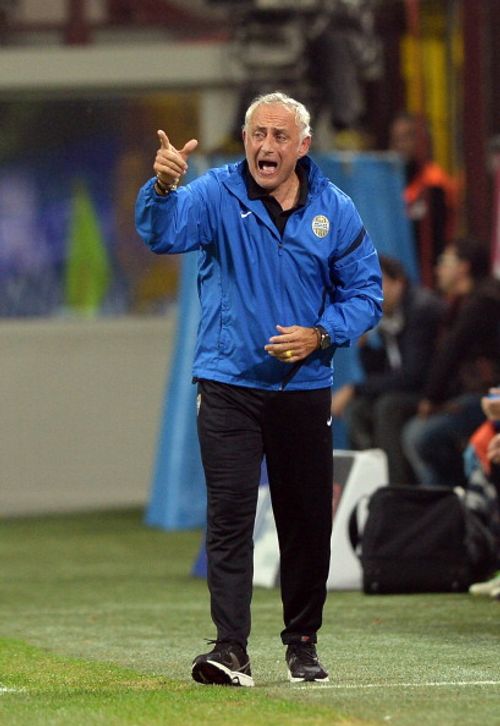
Hellas Verona: Slumbering Serie A's captivating tale of comeback

VERONA, ITALY – NOVEMBER 23: Vangelis Moras (L) Hellas Verona FC shows his dejection after the Serie A match between Hellas Verona FC and AC Chievo Verona at Stadio Marc’Antonio Bentegodi on November 23, 2013 in Verona, Italy.
It was over. And for all the hope, the sense of grandeur and the clinging hysteria associated with it for the last 11 years, this was not the end that the fans at Stadio Marc’ Antonio Bentegodi had painted in their imagination. Yet it happened this Saturday – Hellas lost the local derby to Chievo at the heart of Verona to silence most of the 44,000 Veronesi in the arena.
Traditionally, Hellas takes pride in having the most animated bunch of supporters in the Serie A. However, the silence imposed by a painful defeat against their arch-rivals kills every bit of excitement in this part of the country. Football, here in Verona, is quite literally more than life or death for Hellas Verona.
Of course, in an attempt to downplay the occasion, the neutrals would also like to point out that Hellas lost their 100 percent home record they had maintained on their return to Serie A. But try telling that to the agitated Veronesi as they try to deal with an array of emotional conflicts capable of undermining any piece of statistical insight.
It is fair to say that lots of prayers and sacrifices had gone into this one fixture. Especially from the Scaligeri clan, which was staring at the possibility of losing its most prized possession – its club – forever. While on the other side of the city Chievo were relishing their top flight stint, Hellas, one of the elite few clubs with a hundred-year history in Italy, were dwindling along the phase of possibly getting relegated to the fourth division.
Moreover, with the club gradually losing their financial footing after their Serie A exit in 2002, talks were held of dissolution, or even a merger with the rivals Chievo. However, this was unacceptable for the Hellas fans who had religiously supported their side in the toughest times and were willing to do so for years to come. Dissolution of the club would rob the identity of every fan who starts his or her weekend with a prayer at Santa Maria Antica church and who thrives on the hopes of the side’s victory. Even though Chievo has seen a surge in the past one decade, Hellas remains the biggest team in Verona and has always represented an integral part of Veronesi culture.
Thankfully, Giovanni Martinelli, the club president true to his roots, assured everyone that the right steps would be taken towards reviving the club. One of the first few steps was the introduction of Andrea Mandorlini who, in the past three years, has scripted drama worthy of another Shakespearean play at the helm of Verona.
From what looked like a chaotic pitfall the whole of the last decade, the atmosphere around Hellas gradually witnessed a shift towards a more accustomed frenzy. This was their time to celebrate liberation from the unfamiliar mediocrity they’d suffered. And with crucial financial intervention from Maurizio Setti – the team’s former kit-man turned fashion industry elite – Hellas Verona had a reason to expect an imminent revival.

Andrea Mandorlini – The Hellas Verona manager.
Soon enough, the results started reflecting the enthusiasm, and Mandorlini’s combative style of play earned a fair share of plaudits. With two promotions in three years, the manager must feel he has done enough after rejecting the offer of being No. 2 to his idol Jose Mourinho.
Sure, several critics have suggested that the managerial talent of the former Scudetto winner came at a premium, with his serial touchline brawls already treated as legend at the club. Yet, one must not forget that Hellas had made a reputation of being one of the most defiant set-ups in the Italian football system in the 80s.
Racking up Scudetto-denying results against the Milan giants defied logic, and the crowd barely missed out on any chance to let their antics disrupt the state of the game, so it’s a given that courteousness and discipline will never have a place in the Veronesi football culture.
So when compared to his predecessors and measured against the club identity, Mandorlini remained the most suitable manager in these turbulent times of the club’s history.
Now, when they are back among the big boys of Italian football, historians might want to point out it was inevitable that they would start off their campaign with a win against AC Milan. With the team built around Luca Toni (who at 36 years of age has stopped by for one last challenge) and youngsters like Juan Iturbe and Jorginho that have looked sharp from the word ‘go’, Hellas have gather momentum in the early stages of the Serie A.
What made the setting even more appealing for the Gialloblu was watching their neighbours, Chievo, struggling to keep pace and sitting at rock bottom in the table. Which was why Saturday had tremendous sentimental value for Mandorlini’s men, as the crowd expected them to show Chievo their rightful place.
From being mocked for the best part of the past decade, it was their time to revel in glory. Yet, this splendid tale of retribution was destined for a rather sour ending. On Saturday, out of nowhere, Chievo managed to bring their “A” game and even managed to nullify any attacking threat from the home side. In contests like these, where emotions bear more value than performance, it is usually an early goal that ends up killing the encounter. Chievo took their chances and put their solitary effort in the first 45 minutes past the home defence to make it 1-0, and it stayed so at the end of play.
Yes, it wasn’t worth the wait for the home side. It wasn’t even a performance that would rank close to their past six consecutive wins on the home turf. However, Mandorlini and Co. have seen enough setbacks to remain unaffected by Saturday’s mini-disaster. The side, in its comeback season, is still in contention for a European spot as its rivals struggle to survive the season – a sight that could still cheer a fan when he or she takes a look at the table on a Monday morning.
Sure, it may have been 11 years of wait for a lost battle, but after a decade of outright misery, Hellas Verona have earned themselves plenty of memorable nights in the near future.